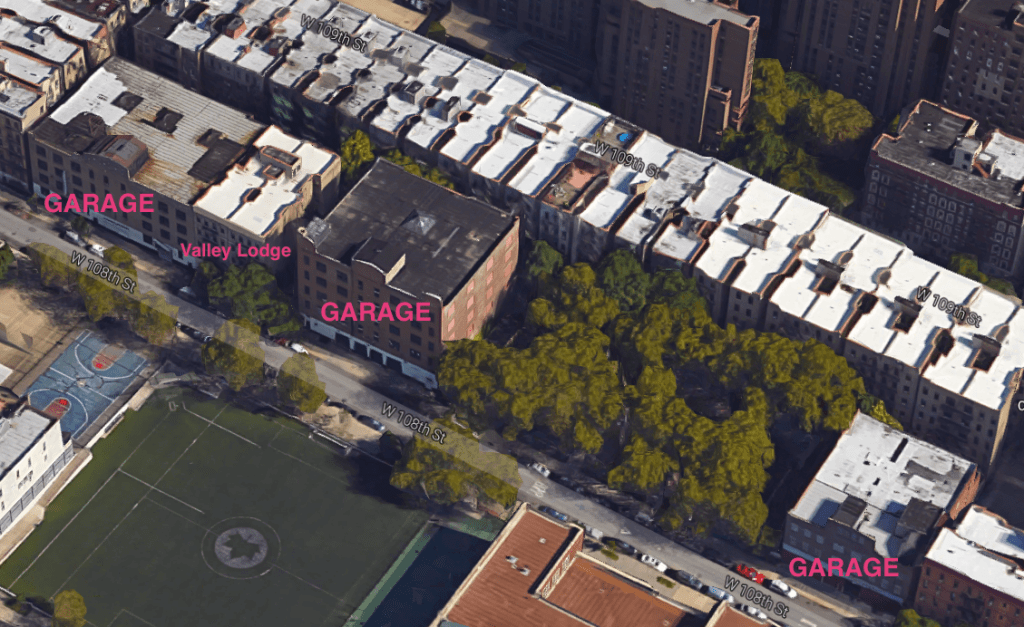Which do New Yorkers value more: parking garages to store cars or apartments to house neighbors? Rarely is the question framed as starkly as with the plan to demolish two city-owned parking garages and build 304 units of subsidized housing on 108th Street.
The West Side Federation for Senior and Supportive Housing (WSFSSH) is looking to replace an existing homeless shelter and the 675 parking spaces in those garages with 194 rentals for households making 60 percent or less of the area median income plus 110 beds for a transitional homeless shelter for seniors.
The prospect of subtracting hundreds of parking spots to make room for housing has stoked an intense backlash among some nearby residents. But they don't represent the majority: This is a neighborhood with excellent transit access, where 80 percent of households don't own cars.
Last night, at a Manhattan Community Board 7 forum on the project attended by about 200 people, a well-organized contingent of supporters far outnumbered opponents. (A second forum will follow in November.) There was no vote -- the event was all about airing opinions in public. Here's a look at some of their perspectives and how certain New Yorkers view their private car storage as a worthier need than housing.
Tradeoffs? What tradeoffs?
Parking is expensive to build. An underground garage with space for 118 vehicles would cost $17 million, according to a WSFSSH-commissioned estimate by Nelson/Nygaard. There is no way to accommodate car storage while delivering affordably-priced housing.
But to many people who spoke last night, the costs imposed by parking just didn't register.
"There should be a way of finding the solution for both the housing, which we all support, and also the other community need," said local resident David Dubin. "There are a great number of people who park in those garages who desperately need their cars for their health and for their occupations."
"Why is it being positioned as car owners, or business owners -- taxpaying business owners -- versus people who need housing?" asked Tom Powell, who told Streetsblog he parks extra-wide vehicles for his photography businesses in one of the garages.
For the record, the Nelson/Nygaard study found 3,500 garage spaces within a 12-block radius of the project site. There will be fewer parking spaces if these two garages are demolished, but it won't be impossible to park off-street.
The dog whistlers and NIMBYs
For some opponents, their perspective was rooted in a desire to keep other people out.
"I'm not here to oppose any of the impassioned pleas about affordable housing, however, I am here to support reasonable and responsible balance in urban planning," said Albert Bergeret. "When you take away a resource [he meant parking] that supports those who have the means, and replacing them with those who don’t have the means, you drive the neighborhood down, not up."
Another opponent, Ronald Hoffman, told Streetsblog he was primarily concerned about "the segregated community of Manhattan Valley," and the "high concentration of low-income affordable housing" in the neighborhood. He argued that the new affordable housing units should be built below 96th Street.
"When you concentrate people of one socioeconomic background in one area, you're segregating," he said. "By sending more people into an already segregated community, you're going to have less opportunity for people."
While Manhattan Valley is lower-income than the Upper West Side as a whole, market rents are rising fast. This project will enable hundreds of people to afford living in an area they otherwise wouldn't be able to.
The parking fundamentalist
One line of argument positioned car owners as the beating heart of New York City.
"People living in the city who are paying taxes, who can afford a car, and want to have that lifestyle need a place to put their car," said Steven O'Gallagher, a neighborhood resident who said he needs his car to drive his kids to sporting events outside the city. "Like it or not, they're the people who are paying excess taxes in so that the people who don't have as much money can get something out of the system. If you take away the ability for people who are [paying] excess tax to have a decent life in the city, they will leave."
"If I can't park my car, I will simply leave the city, and I will take my taxes with me," O'Gallagher said.
The housing-before-parking crowd
Most people who attended last night want the project to move forward, including Sarah Kolodny, who uses one of the garages slated for demolition.
"My car is parked at 151 West 108th Street. I'm sorry at the prospect of losing this parking space," she told the crowd. "It's affordable, and it's very convenient. But when it comes to a choice between affordable housing and a parking garage, it's a no-brainer."
David Broxton, who used to live at the transitional shelter, Valley Lodge, and currently works with clients there, put it all in perspective. "Valley Lodge saved my life," he said. "When I have people talking about parking their car, how can you compare a car to a life?"






